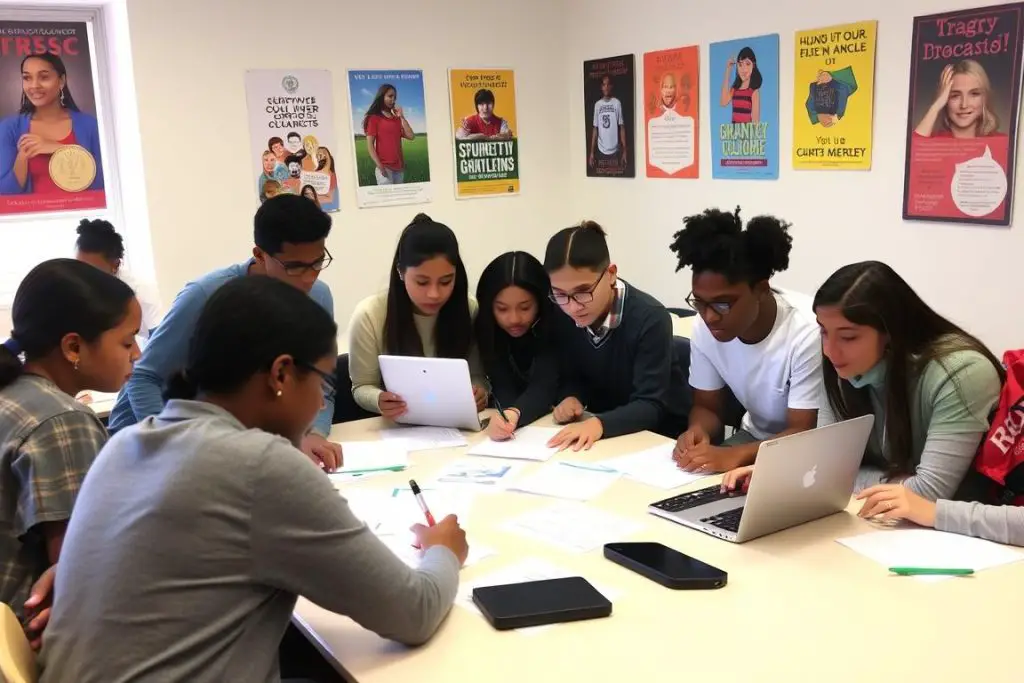Educational Grants That Make College More Affordable: Here’s What You Need to Know

Imagine you’re at the start of your future. Higher education opens its doors to you. Yet, the high cost of tuition might look like a huge obstacle. Here, we discover the hidden heroes: educational grants. In the U.S., these grants are key in helping many students overcome the financial hurdles of college. They transform the dream of higher education from a major cost into something you can actually achieve.
Financial aid for education levels the playing field. It provides a base for dreams to grow and futures to be made. When looking into student funding, it’s important to know there’s a wealth of resources available. This guide aims to clear up any confusion about educational grants. It will highlight their crucial role in making college more affordable for you.
Key Takeaways
- Discover the transformative power of educational grants in making college accessible.
- Identify the various educational funding options available to prospective college students.
- Learn how to differentiate between grants and other forms of financial aid for education.
- Understand the role of financial aid in leveling the academic playing field.
- Prepare to navigate the landscape of funding for students with informed confidence.
Understanding Educational Grants and Scholarships
Starting the path to higher education can feel costly. But with knowledge about educational grants and scholarship programs, financial worries can lessen. We aim to clear up the facts on these crucial aids. We’ll cover how grants function, how they differ from scholarships, and the types you might get.
The basics of educational grants and how they work
Educational grants are free money given to students for their schooling. Unlike loans, you don’t have to pay these grant opportunities back, which makes them very appealing. They can be from the government, state, or private groups. They’re given for need or achievements, or sometimes both. Knowing how these funds are given out can really help in using them well.
Difference between grants and scholarships
Educational grants and scholarship programs both offer needed financial help but differ in their criteria and sources. Scholarships often look at your grades or talents, focusing on merit. Grants usually focus on financial need. Understanding the differences can make your search for aid more focused.
Types of grants: Federal, State, and Private
There are many grants, each with its own benefits, depending on your educational goals and situation:
- Federal Grants: These, like the Pell Grant, are typically based on financial need and come from the federal government.
- State Grants: You’ll need to live in the state and they look at both your need and your merit.
- Private Grants: These come from businesses, charities, and foundations, and may focus on your study area or personal background.
Understanding the variety of grant opportunities can help make your education more affordable. Below is a table detailing different grant types:
| Type of Grant | Source | Criteria |
|---|---|---|
| Federal | Government | Financial Need |
| State | State Governments | Residency, Need/Merit |
| Private | Corporations, Non-profits | Field-Specific, Demographic Focus |
By researching educational grants and scholarship programs, you’re taking a vital step toward affordable education. Remember, each has its application rules and deadlines, so start gathering info early.
Educational Grants: Eligibility and How to Apply
Getting educational grants can make your study dreams come true. This article helps you understand how to qualify and apply for financial aid for education. Read on for tips on meeting grant requirements and navigating the application process.
Qualifying for educational grants involves a few key factors. These include your financial situation, school performance, and where you live. Make sure to check each grant’s unique requirements, as they differ across federal, state, and private funders.
- Financial Need: Most government-funded grants ask for proof of needing financial help. Your FAFSA results usually show this need.
- Academic Achievement: Some grants, like college scholarships, are based on high grades or special skills in subjects or activities.
- Residency: You might need to live in a certain state or area for some grants. Always verify this requirement.
Once you know you’re eligible, focus on applying correctly. Each grant has its own rules and deadlines. Following them closely increases your chance of winning the grant.
| Type of Grant | Key Documents Required | Application Deadline |
|---|---|---|
| Federal Grants | FAFSA, IRS Tax Returns, Academic Transcripts | June 30 annually |
| State Grants | State-specific financial aid applications, Proof of Residency | Varies by state |
| Private Grants | Personal essays, Letters of recommendation, Project proposals (if applicable) | Depends on the provider |
To improve your chances, apply to many grants at once. The better your applications, the higher your likelihood of getting aid. Writing strong personal essays and being organized are key methods to shine among many applicants.
In summary, applying for educational grants might seem hard, but a detailed and early start helps. Being careful and seeking help when needed sets you up for success. Early preparation ensures you meet every deadline and requirement, boosting your chances of getting financial aid.
Conclusion
As our journey through educational grants ends, we see they’re more than money. They open doors for those eager to learn without debt. These grants support students who face financial challenges. They help them improve their knowledge and skills.
Exploring educational grants lets you uncover many learning opportunities. You now know how to spot different grants and check if you’re eligible. You also learned how to apply effectively. The success of your application relies on how well it fits the grant’s goals. For tips on creating strong proposals, check out The Writing Center.
Let this knowledge guide you to the grants that match your dreams and career plans. Good research and a solid application plan are key. Remember, securing a grant is an investment in your education and future career. So, work hard on your proposal and show your passion. Believe in your efforts to win educational grants. They’re steps towards your success.







